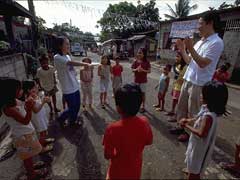
Members of a Japanese NGO with local children in the Philippines.
The Japanese government offers various assistance programs to meet the diverse needs of developing countries through ODA. In international cooperation, the role of NGOs and local governments has become more important, both in Japan and in developing countries.
The JICA Partnership Program (JPP) was introduced in 2002 to support and cooperate with the implementation of projects formulated by Japanese NGOs, Japanese local governments, and Japanese universities to utilize their accumulated knowledge and experience in assistance activities for developing countries.
JPP is a technical cooperation program implemented by JICA to contribute to the social and economic development of developing countries at the grass-roots level in collaboration with "Partners in Japan," such as NGOs, universities, local governments, and public corporations.
The main objectives of JPP are as follows:
- 1 . Meeting the diverse needs of developing countries by utilizing the knowledge and experience of Partners in Japan for international cooperation activities
- 2 . Strengthening collaboration between communities in both developing countries and Japan by promoting the participation of Japanese citizens in international cooperation activities
- 3 . Encouraging local citizens in Japan to employ their knowledge, experience, and technologies for international cooperation activities, which in turn revitalize Japanese communities
The target countries are those that have approved the acceptance of JPP and where JICA overseas offices or JICA/JOCV offices are in place.
The program is implemented by JICA in collaboration with Partners in Japan based on proposals submitted by the Partners. The recipient government's approval is necessary prior to implementation of the program or individual projects, in accordance with the procedures agreed upon between the two governments. Because JPP is not based on official requests from the recipient government, there is no requirement for an international agreement between the governments of the recipient country and Japan.
The recipient government is not required to grant any special privileges, such as tax exemptions, to Partners in Japan. However, the recipient government is expected to accord the same privileges, exemptions, and benefits as those accorded to any third-country organization or international organization performing similar missions in the recipient country.
-
CAMBODIA: Primary Education Project in Kampong Chhnang Province, Cambodia
Foundation for International Development/Relief -
NEPAL: Continuum of Care for Maternal and Child Health in Pokhara
Citizen’s Association for Nepal Exchange -
NEPAL: School Club Based Resilient Community Model Project
Plus Arts -
BANGLADESH: Participatory Integrated Rural Development Project in Ishwarganj in Bangladesh
Shapla Neer = Citizens' Committee in Japan for Overseas Support




scroll